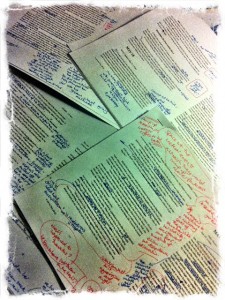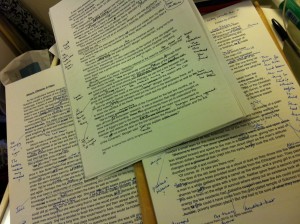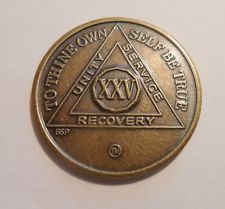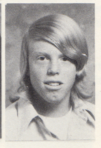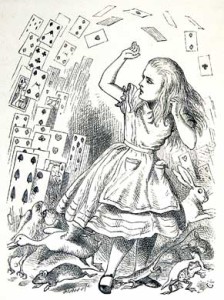by Laura Benedict
@laurabenedict
A few weeks ago, the incredibly generous Joe Moore invited me to blog here at TKZ on alternating Wednesdays. It was an easy “yes” for me because I’ve visited before, and I admire both TKZ’s reputation for excellence and its smart and talented contributors. I toyed with the idea of jumping right in with a specific writing topic, but then I decided it might be better to introduce myself first. So I’ve asked and answered a few questions that will help you get to know me. (Forgive the slightly snarky tone of the questions. Sometimes I’m a grouchy interviewer.)
Let’s start with an easy question. Where are you from?
I was born in Cincinnati, Ohio, but grew up in Louisville, Kentucky. I graduated from college and worked in St. Louis, then moved to rural West Virginia where my husband’s family had a dairy farm. After a chilly two-year excursion to Holland, Michigan, we went back east to Roanoke, Virginia, for eight years. Now we live in Southern Illinois, which is an hour closer to Tupelo, Mississippi than it is to Chicago. Setting plays a big role in my fiction, and up to this point I’ve stuck pretty closely to those locations.
When did you start writing fiction?
As a child and young adult, I was always a reader, but I didn’t have the confidence to imagine I could be a writer—amateur or professional. It wasn’t until I was working for A Great Big Beer Company in St. Louis, and found myself tinkering with the professional copy I was buying for sales promotion projects, that I even considered writing fiction. (You’ll note the connection in my mind between ad copy and fiction.) By then I was in my mid-twenties. I didn’t publish my first novel until I was in my forties.
What kind of books do you write?
I’ve always been drawn to the darker side of fiction, and perhaps that’s why I can never find happiness writing about those quotidian epiphanies that are so popular in academic/literary circles. It wasn’t until I wrote my third novel that I really found my voice—and it was a supernatural story called Isabella Moon, about a woman who tries to solve the murder of a little girl while on the run from her psychotic husband. That novel was the first one I sold, as part of a two-book deal with Ballantine. My latest novels are a gothic trilogy set in a haunted house in a fictional Virginia town: Bliss House, Charlotte’s Story, and The Abandoned Heart (Pegasus Crime, October 2016). Despite their pretty covers, they are not quiet books for the faint of heart. As I mentioned, I write short stories as well. They show up in various places and run the gamut from straight mysteries to the horrific and surreal. In fact, my absurdly talented writer husband, Pinckney Benedict, and I edited an anthology series of southern surreal stories called Surreal South. You can take a peek at my website or author page to read more about all of my work.
You look like such a nice lady. Why do you write creepy stories?
I look forward to talking about how I—and other writers—choose stories to write. But as to the why? Sorry. That’s between my therapist and me. As you get to know me better, you might hazard a guess or two—and I just may tell you if you’re right!
Why are the most ragged, dog-eared books on your bookshelf Cormac McCarthy’s Blood Meridian and Daphne du Maurier’s Rebecca? Talk about a peculiar pair.
I’ve never been one for chasing down celebrities, but I confess I’d love to have had dinner with Daphne and Cormac just to see what they’d make of each other. But—with apologies to every writer here—I’ve found that most writers aren’t so great at talking about or even understanding their own stories. It’s the books that are important. Besides being darned good reads, Blood Meridian and Rebecca both contain elements that appeal to me as both writer and reader: complex, disturbing crimes, unforgettable characters, and settings that are, themselves, active characters.
Pantser or Plotter?
I suspected this question was coming. To borrow a description from my friend, Jordan Dane, I’d say I’m a recovering pantser. Up until very recently, my mantra excuse was, “If I figure out the plot ahead of time, I’ll have told myself the story and I’ll be bored and won’t want to write it.” What I’ve learned—the hard way—is that there’s a lot of pleasure to be had in pondering plot and character before getting into the writing. And there’s much, much more to it than saying this needs to happen, then this, etc. The first inkling of each story nearly always comes to me as a vivid image—usually of a protagonist or a setting. But that’s not a heck of a lot to hang a novel on, and thus the plot often reveals itself with an agonizing slowness that undermines my production goals. I’ll get into this later, but for a long time I bought into the notion that the story was a sacred object, and if I manipulated it, it would become over determined and wouldn’t work.
Do you have an MFA? Have you been educated by highly trained writing professionals?
No, and let me think about that for a moment.
Approximately a hundred and fifty years ago, I got a B.S. in Business Administration with a major in finance. I didn’t take a single writing class until I was well into a promotions career with the subsidiary of A Great Big Beer Company in St. Louis. After I took a couple undergrad creative writing classes, I talked my way into a grad fiction workshop and was promptly and roundly mocked for my plot-heavy stories. The professor said they were too old-fashioned to be published. Ouch. But being a contrary sort, I decided to forge ahead. I understood that I wasn’t trained to write literary fiction (which I consider a genre, not an end-game—more on that later, too), and after the workshop experience, I wasn’t much interested to learn. So I read more than ever (classics, literary and commercial fiction and non-fiction) and wrote even more. I wrote short stories and entered many, many contests. In 2000, I discovered a Joyce Carol Oates story in Ellery Queen’s Mystery Magazine, and told myself that if she—one of my literary idols—wrote for EQMM, then I should give it a shot. They published my story, The Hollow Woman, in their Department of First Stories in 2001. (My third EQMM story, The Peter Rabbit Killers, is in the recent July issue. And you can listen to me read The Erstwhile Groom on their Podomatic website.)
When I decided to write novels, I swallowed my pride and took a couple of independent studies and workshops to give myself some deadlines. I know I learned at least as much from the other participants as I did from the teachers. Of course, the best teachers are always books themselves.
Do you know anything about independent publishing, or are you strictly about traditional publishing?
When the great publishing purge of 2009/2010 occurred (does anyone else remember that, or was it just my personal cataclysm?), I was dropped by my publisher. I panicked and pouted for two years, but I also kept writing and, after my next novel didn’t find a traditional home, I delved into the brave new world of independent publishing. My husband and I started our own small press and put out my third novel in ebook and paper. Since then I’ve published my backlist, a Bliss House short story, and a couple of anthologies. There’s more on the way.
I’m a big believer in using the right delivery system for the right story. And never giving up. I’m happy to share what I know, and am always anxious to learn from others in the business.
Do you have a day job, or do you just sit in your house and write all day?
For the past twenty-four years, parenting and writing have been my competing jobs. I homeschooled my daughter at various points up until high school, and am now partially homeschooling my sixteen year-old son. My mornings are for writing business, promotion, research, and/or social media. Homeschool is in the afternoon, then I write before dinner and into the wee hours. I have raging ADHD but can’t write on medication, so staying at my desk to write is a major act of will for me.
If you follow astrology profiles, you already know that my early July birthday makes me a Cancer, and Cancers are often introverted homebodies. Though I do like to get out and meet readers and socialize at conferences and book festivals. If you’re wondering what I’m currently up to, let’s get together on Twitter, Facebook, Instagram, and at my website.
Do you teach writing, or do you just write?
I’ve taught at many writing workshops over the years, including the residential Tinker Mountain Writers’ Workshop at Hollins University, and the Appalachian Writers’ Workshop. I’ve also done many smaller writing workshops for both children and adults.
What do you bring to The Kill Zone party?
I bring my love for the written word along with me, and my enthusiasm for sharing what I’ve learned with emerging writers. I bring my curiosity and hunger to learn and adapt. Also, I always have chocolate to share, and occasionally even a salad in my purse.
I’m thrilled and delighted to be here, but that’s enough about me. Tell me a bit about yourself and what brings you here.


